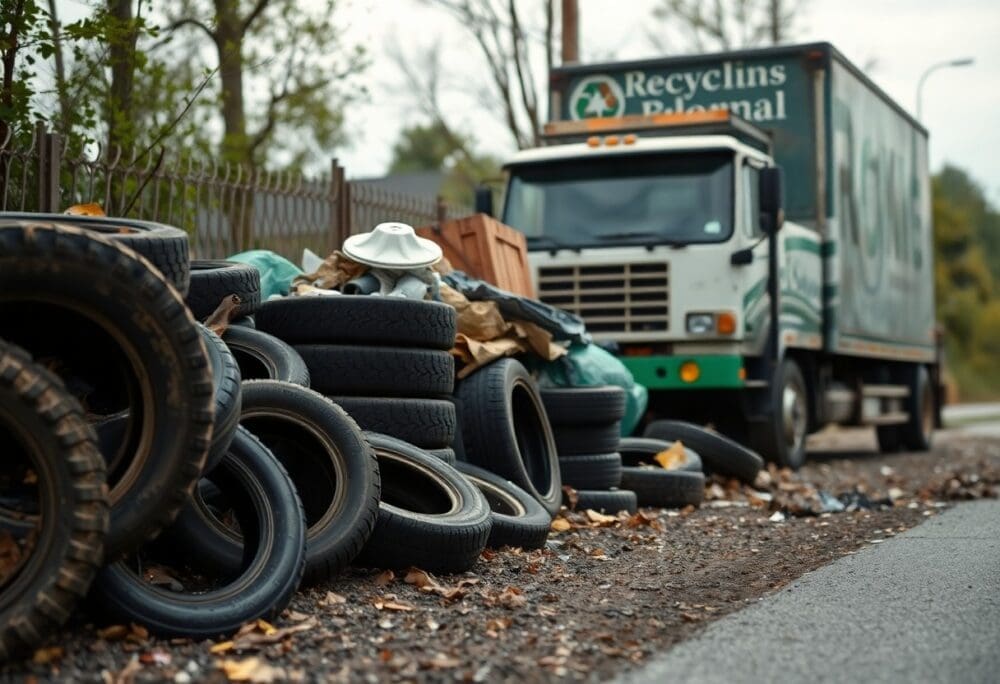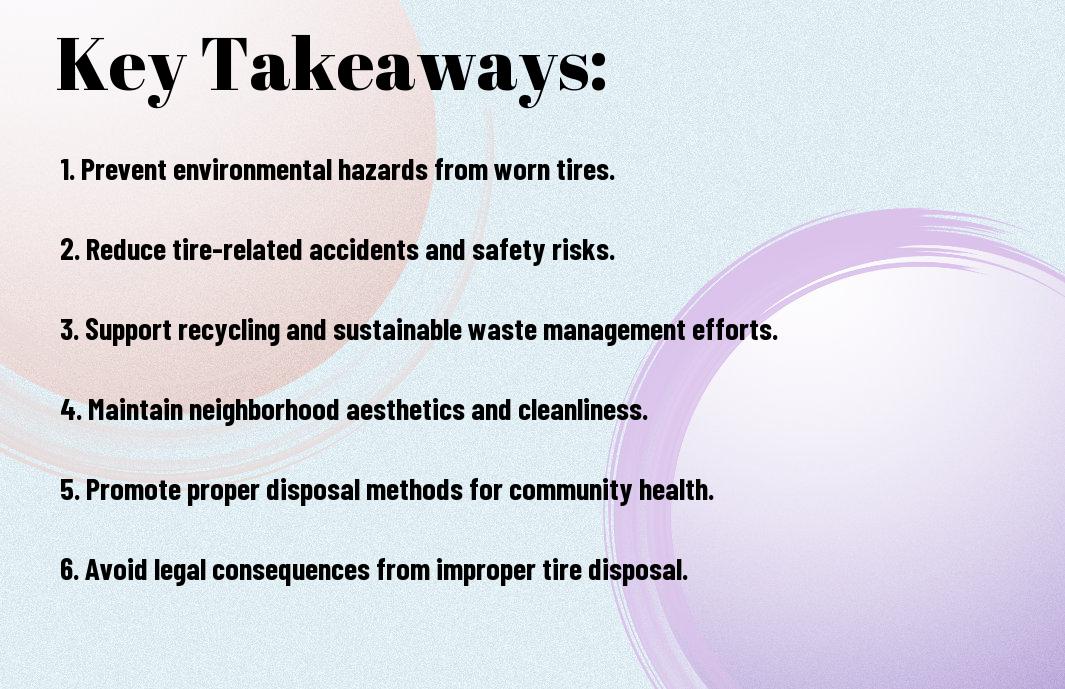It’s vital for you to understand the significance of proper junk removal for worn tires. Discarding old tires incorrectly can lead to environmental hazards, as they can release harmful toxins and contribute to pollution. Additionally, failing to dispose of tires responsibly may pose safety risks by creating breeding grounds for pests and accidents. By learning the correct ways to dispose of your worn tires, you not only protect the environment but also promote a safer community. In this post, you will discover the benefits and methods of effective tire disposal.
Key Takeaways:
- Improper disposal of worn tires can lead to environmental hazards, including pollution and potential harm to wildlife.
- Proper junk removal ensures that tires are recycled or repurposed, contributing to sustainable practices and reducing landfill waste.
- Removing worn tires safely mitigates risks of accidents and injuries caused by abandoned or improperly stacked tires in residential or commercial areas.
The Environmental Impact of Worn Tires
Before you discard your worn tires, it’s important to understand the broader environmental implications. Worn tires, if not removed and disposed of correctly, can lead to significant ecological damage. Improper junk removal contributes to landfills overflowing with waste, while also posing serious threats to surrounding ecosystems. As a responsible individual, recognizing and addressing these impacts is vital in preserving your environment for future generations.
Pollution and Contamination Risks
On the surface, worn tires may seem innocuous, but they can release harmful chemicals and materials into the soil and water. Leaking oils, heavy metals, and microplastics pose a risk not only to the environment but also to human health. By opting for proper junk removal, you can mitigate these pollution risks and protect your community’s resources.
The Role of Waste Tires in Ecosystems
With environmental pressures on the rise, understanding the role of waste tires in ecosystems becomes even more important. When tires are improperly disposed of, they can accumulate in various locations, disrupting native flora and fauna. This accumulation contributes to habitat destruction and alters local biodiversity, affecting the balance of ecosystems in your area.
Even more concerning, waste tires can create breeding grounds for pests and insects, which can further impact the health of your local ecosystem. For example, stagnant water that collects in discarded tires often becomes a breeding site for mosquitoes, leading to increased disease transmission risks. By ensuring that your worn tires are disposed of responsibly, you can help safeguard your environment and the well-being of the community around you.
Health Hazards Associated with Improper Tire Disposal
There’s a significant risk to both health and the environment when worn tires are disposed of improperly. Not only do they create unsightly waste, but they also pose serious health hazards by attracting harmful pests and potentially releasing toxic substances into the surrounding area.
Fire Risks and Toxic Fumes
Improper tire disposal can lead to severe fire risks, as tires are highly flammable. In the event of a fire, they generate toxic fumes and pollutants that can cause respiratory issues and environmental contamination, putting your health and that of others at risk.
Breeding Grounds for Pests and Disease
For those who care about their health and community, improper tire disposal can create breeding grounds for pests and disease. Stagnant water can accumulate in old tires, attracting mosquitoes and other vermin, which can transmit harmful diseases to humans and pets.
Hazards associated with breeding pests go beyond mere annoyance. Tires filled with stagnant water can become incubators for mosquitoes, increasing the risk of diseases like West Nile virus and Zika virus. Additionally, rodents and other animals may nest in discarded tires, leading to potential infestations that can affect your home and surroundings, thus impacting your overall well-being and that of your community.
Legal Regulations and Compliance
For responsible junk removal, understanding and adhering to legal regulations is vital. Proper disposal of worn tires isn’t just a best practice; it’s a legal requirement that helps protect the environment and public health. You need to be aware of local and federal guidelines to avoid any complications during the disposal process.
Local and Federal Laws on Tire Disposal
Before disposing of your worn tires, understand the specific local and federal laws in your area. Many jurisdictions have strict regulations that dictate how tires should be handled and where they can be taken. Failing to comply with these laws could lead to serious consequences.
Penalties for Non-Compliance
Before you ignore the regulations on tire disposal, consider the potential penalties for non-compliance. Various governing bodies enforce fines and legal repercussions for individuals and businesses that improperly dispose of tires, leaving you liable for hefty charges.
For instance, fines for illegal disposal can range significantly based on the severity of the violation, sometimes reaching thousands of dollars. Additionally, repeated offenses may lead to stricter penalties or even criminal charges. It’s important to prioritize compliance and utilize proper junk removal services to protect yourself from such consequences and contribute positively to the environment.
Economic Benefits of Proper Junk Removal
Keep in mind that proper junk removal, especially for worn tires, plays a significant role in bolstering the economy. By managing tire waste effectively, you contribute to local job creation and promote recycling industries, ultimately leading to cost savings for your community. This process not only reduces environmental hazards but also stimulates economic growth through increased workforce opportunities and investments in sustainable practices.
Job Creation in Recycling Industries
By investing in proper junk removal, you help create new job opportunities in recycling industries. These jobs often require skilled labor, which not only enhances your local economy but also provides training and career development for workers. When you support recycling efforts, you contribute to a sustainable cycle that benefits both the environment and your community’s workforce.
Cost Savings for Communities
Above all, proper junk removal leads to substantial cost savings for communities. By efficiently disposing of worn tires, you can prevent possible environmental cleanup costs and reduce the burden on local landfills. This proactive approach decreases the financial strain on municipal services, freeing up funds for other crucial areas such as education, infrastructure, and public safety.
In fact, the savings from reduced waste management costs can significantly enhance your community’s financial health. When local governments invest less in managing tire waste, they can allocate more resources toward public amenities and services. Additionally, neighborhoods that prioritize sustainable waste practices often attract new businesses and residents, further contributing to economic growth. By being proactive in junk removal, you not only protect the environment but also promote a healthier economy and lifestyle for everyone in your community.
Sustainable Practices for Tire Disposal
Not all disposal methods for worn tires are created equal. While it may be tempting to simply toss them in a landfill, proper junk removal is crucial for environmental health. By using trusted services like How to Get Rid of Tires, you can ensure your tires are recycled responsibly and sustainably, reducing your ecological footprint.
Recycling and Reusing Tire Materials
Sustainable practices in tire disposal involve recycling and reusing tire materials whenever possible. By opting for facilities that specialize in tire recycling, you can contribute to a circular economy. Recycled tires can be transformed into various products, such as asphalt, playground surfaces, or even fuel, thereby lessening the demand for new materials and promoting a greener planet.
Innovative Solutions in Tire Management
Before considering your next tire change, it’s worth exploring innovative solutions available for tire management. New technologies have emerged that not only enhance the recycling process but also prioritize sustainability. These initiatives focus on reducing waste and maximizing the life cycle of tire products.
Practices such as tire crumb recycling allow for the incorporation of used tires into new manufacturing processes, contributing to eco-friendly products like rubberized asphalt. Additionally, advancements in tire retreading enable you to extend the life of your tires significantly. By embracing these innovative approaches, you actively participate in reducing waste and supporting a more sustainable future.
How to Choose a Reliable Junk Removal Service
All junk removal services are not created equal, so selecting a trustworthy provider is crucial for effective tire disposal. You should prioritize companies that have a solid reputation, transparent pricing, and environmentally responsible practices. Look for services that value customer satisfaction and have an established history of properly disposing of tires.
Key Factors to Consider
An informed decision involves evaluating several key factors that ensure you find a reliable junk removal service. These include:
- Licensing and insurance
- Experience and customer reviews
- Environmental practices
- Transparent pricing
Any reputable company will be willing to address your concerns and provide the information you need.
Questions to Ask Potential Providers
Along your search for a junk removal service, it’s vital to ask pertinent questions to gauge their expertise and reliability. Consider inquiring about their process for handling tires, any fees associated with service, and what practices they follow for environmentally-friendly disposal.
Service-oriented providers will be forthcoming about their operational methods and the steps they take to minimize waste. You’ll also want to ask about their customer service policies, timelines for service, and whether they offer any additional services that could be beneficial to you. By being thorough in your inquiry, you can ensure that you choose a provider who aligns with your values and needs.
Final Words
Taking this into account, proper junk removal for worn tires is necessary for your safety and the environment. Disposing of tires irresponsibly can lead to hazardous situations, such as fires and breeding grounds for pests. By ensuring that your tires are removed and recycled correctly, you contribute to a cleaner community and promote sustainable practices. This not only protects your surroundings but also helps you avoid potential fines and legal issues. Prioritizing responsible tire disposal is a smart choice for both you and the planet.
Q: Why is it important to properly dispose of worn tires?
A: Proper disposal of worn tires is important to prevent environmental hazards. When tires are improperly discarded, they can release harmful chemicals into the soil and waterways, contributing to pollution. Additionally, tires left abandoned can become breeding grounds for pests such as mosquitoes, which can pose health risks. By ensuring that worn tires are removed responsibly, we can help protect the environment and public health.
Q: How does improper tire disposal affect the community?
A: Improper tire disposal can have negative effects on the community by leading to clutter and unsafe environments. Abandoned tires can accumulate in vacant lots and streets, creating an eyesore and detracting from the aesthetic value of neighborhoods. Moreover, this can also lead to a decrease in property values as the presence of debris can make areas seem neglected. Addressing worn tire removal responsibly fosters a cleaner, safer community for everyone.
Q: What are the benefits of professional junk removal services for worn tires?
A: Utilizing professional junk removal services for worn tires offers numerous benefits, including convenience and expertise. These services are equipped to handle the safe transport and recycling of tires, ensuring they are processed according to local regulations. This means that the tires are either properly recycled or disposed of in an environmentally friendly manner. Additionally, hiring professionals can save individuals time and effort, allowing them to focus on other priorities while ensuring that their used tires are handled responsibly.







